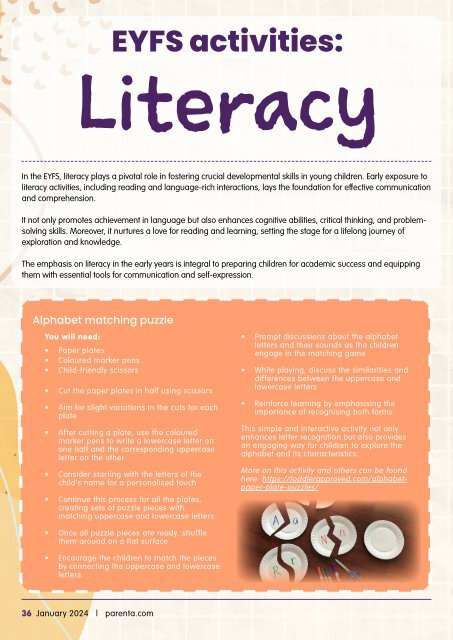January 2024 Parenta magazine_website
- No tags were found...
Create successful ePaper yourself
Turn your PDF publications into a flip-book with our unique Google optimized e-Paper software.
EYFS activities:<br />
Literacy<br />
In the EYFS, literacy plays a pivotal role in fostering crucial developmental skills in young children. Early exposure to<br />
literacy activities, including reading and language-rich interactions, lays the foundation for effective communication<br />
and comprehension.<br />
It not only promotes achievement in language but also enhances cognitive abilities, critical thinking, and problemsolving<br />
skills. Moreover, it nurtures a love for reading and learning, setting the stage for a lifelong journey of<br />
exploration and knowledge.<br />
The emphasis on literacy in the early years is integral to preparing children for academic success and equipping<br />
them with essential tools for communication and self-expression.<br />
Word tracing with pom-poms<br />
You will need:<br />
• Printed word templates or marker pen and<br />
paper<br />
• Plastic tweezers<br />
• Small pom-pom balls<br />
• Collect printed word templates or use<br />
a marker pen to write words on sheets<br />
of paper. Write simple words or create<br />
sentences on the paper, either using<br />
printed templates or a marker pen<br />
• Make sure to write in large print, or use<br />
large word templates for easy placement of<br />
the pom-pom balls<br />
• Introduce the plastic tweezers to the<br />
children and explain the activity, then<br />
instruct them to use the tweezers to pick up<br />
the small pom-pom balls<br />
• Encourage the children to trace the outline<br />
of the words on the paper using the pompom<br />
balls<br />
• Emphasise feeling the words as they trace,<br />
associating the tactile experience with word<br />
recognition<br />
• Make the activity more engaging by<br />
allowing the children to create their own<br />
patterns or designs while tracing the words<br />
• If using sentences, discuss the meaning of<br />
the words and the context of the sentence<br />
to reinforce understanding<br />
By combining a sensory experience with word<br />
learning, this activity provides a playful and<br />
effective way for children to engage with<br />
language while refining their motor skills.<br />
More on this activity and others can be found<br />
here: https://kindergarteniscrazyfun.com/10-<br />
ways-to-teach-sight-words-for-literacy-stationand-guided-reading-group-activities/<br />
Alphabet matching puzzle<br />
You will need:<br />
• Paper plates<br />
• Coloured marker pens<br />
• Child-friendly scissors<br />
• Cut the paper plates in half using scissors<br />
• Aim for slight variations in the cuts for each<br />
plate<br />
• After cutting a plate, use the coloured<br />
marker pens to write a lowercase letter on<br />
one half and the corresponding uppercase<br />
letter on the other<br />
• Consider starting with the letters of the<br />
child’s name for a personalised touch<br />
• Continue this process for all the plates,<br />
creating sets of puzzle pieces with<br />
matching uppercase and lowercase letters<br />
• Once all puzzle pieces are ready, shuffle<br />
them around on a flat surface<br />
• Encourage the children to match the pieces<br />
by connecting the uppercase and lowercase<br />
letters<br />
• Prompt discussions about the alphabet<br />
letters and their sounds as the children<br />
engage in the matching game<br />
• While playing, discuss the similarities and<br />
differences between the uppercase and<br />
lowercase letters<br />
• Reinforce learning by emphasising the<br />
importance of recognising both forms<br />
This simple and interactive activity not only<br />
enhances letter recognition but also provides<br />
an engaging way for children to explore the<br />
alphabet and its characteristics.<br />
More on this activity and others can be found<br />
here: https://toddlerapproved.com/alphabetpaper-plate-puzzles/<br />
Storytime fun<br />
You will need:<br />
• A fun storybook<br />
• Choose an engaging and age-appropriate<br />
storybook that captivates the children’s<br />
interest<br />
• Begin reading the story, and after each<br />
sentence or page, encourage the children to<br />
participate actively<br />
• Prompt them to act out the actions of the<br />
story characters<br />
• Engage the children by asking questions<br />
related to the story<br />
• Encourage them to express themselves<br />
by answering questions and sharing their<br />
thoughts on the narrative<br />
• Watch as their imagination shines through<br />
as they bring the story to life through<br />
actions and responses<br />
• Use this interactive approach to enhance<br />
comprehension skills by ensuring the<br />
children understand the storyline and<br />
characters<br />
• Utilise this opportunity to promote<br />
communication skills by encouraging the<br />
children to articulate their thoughts and<br />
experiences related to the story<br />
• Experiment with different stories and<br />
adapt the level of interaction based on the<br />
children’s age and preferences<br />
• Allow room for creative interpretations and<br />
adaptations of the story actions<br />
By transforming traditional storytime into an<br />
interactive experience, this activity not only<br />
makes reading enjoyable but also contributes<br />
to the holistic development of children,<br />
encompassing comprehension, confidence, and<br />
communication skills.<br />
More on this activity and others can be found<br />
here: https://www.firstdiscoverers.co.uk/earlyyears-literacy-games-activities/<br />
36 <strong>January</strong> <strong>2024</strong> | parenta.com
















